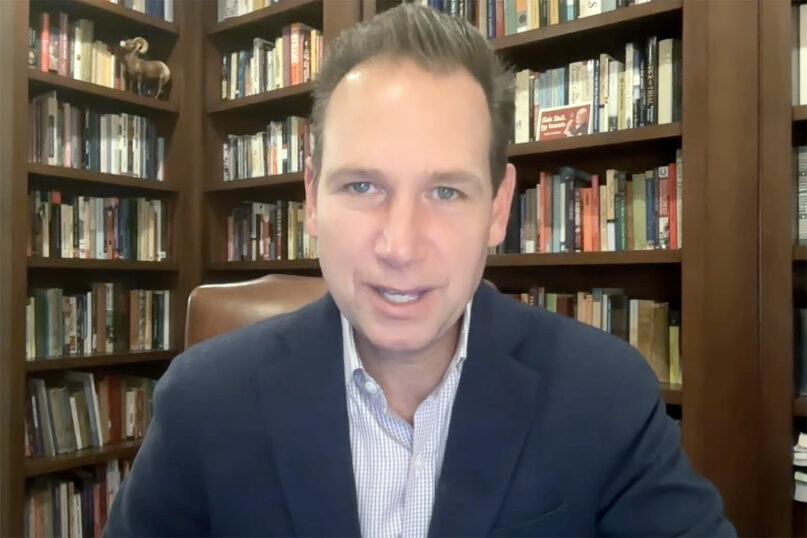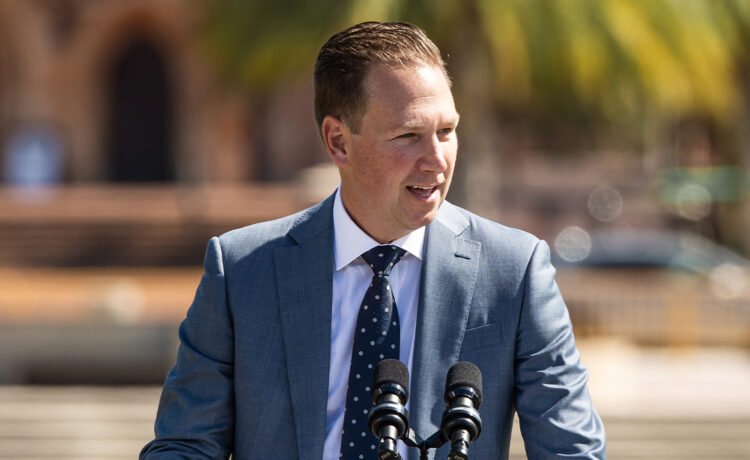(RNS) — President-elect Donald Trump announced Friday (Dec. 20) that he has nominated Brian Burch, the president and co-founder of CatholicVote, as ambassador to the Holy See.
Burch wrote on X that he was “deeply honored and humbled” to be nominated, expressing gratitude to family and those at his organization. “I am committed to working with leaders inside the Vatican and the new Administration to promote the dignity of all people and the common good,” he wrote.
CatholicVote has emerged as a reliable ally of the president-elect and helped to garner Catholic votes for the GOP in November; additionally the lobbying organization and political action committee has focused its efforts on fighting abortion rights, advocating against LGBTQ+ inclusion and civil rights, and criticizing immigrant ministries.
Burch has been a vocal critic of Pope Francis’ decision to oust two conservative Catholic leaders from their positions, and he has dismissed the efforts of the most recent synod, a top priority for the pope, as a ruse.
Ken Hackett, an ambassador to the Holy See during President Barack Obama’s second term, told RNS that while Burch’s opposition to Francis could possibly be overstated, he might run into some trouble in the post.
“This is the pontificate of Pope Francis, and while there may be many in the Curia that don’t agree 100% with everything Francis does or decides, he is still the pope, and if you’re seen as in opposition in any way to him, you’re not going to get the doors open,” Hackett said. “If he has a reputation that is in any way anti-(Pope Francis), I don’t think he’s going to find a lot of comfort.”
Hackett emphasized the difficulty of the job in an interview with RNS. “The job for somebody who has had nothing to do with the Vatican is exceptionally complicated. The Vatican and the various dicasteries in the Vatican operate in ways that you don’t intuitively understand,” he said. “State Department doesn’t tell you exactly how to work in the world of Pope Francis.”
The former ambassador said he received an important piece of advice when he began the job: “It’s not transactional, it’s all relational, and if you understand that, then you build the relations, and building relations takes a long time.”
CatholicVote has slowly emerged as a player in conservative politics, often as a sharp-elbowed crusader in the culture wars. In 2022, the group filed a lawsuit against Joe Biden’s administration targeting Catholic Charities, select bishops and even sisters such as Sister Norma Pimentel, an advocate for immigrants sometimes referred to as “Pope Francis’ favorite nun.” The effort was an attempt to secure communication records between the U.S. government and Catholic groups regarding humanitarian aid at the border. They filed a second, similar lawsuit, to gain access to communication between the groups around controversial abortion laws. In 2023, CatholicVote raised around $500,000 in a failed effort to change the Kansas Constitution to remove the explicit right to an abortion.

CatholicVote President Brian Burch in a recent video. (Video screen grab)
They have also led the way in several high-profile campaigns against LGBTQ+ people, including after the funeral of trans activist Cecilia Gentili at St. Patrick’s Cathedral and amid backlash to the Los Angeles Dodgers honoring a drag and charity group — the Sisters of Perpetual Indulgence, who dress as nuns — during Pride Night.
Marianne Duddy-Burke, executive director of DignityUSA, an LGBTQ+ Catholic organization, told RNS, “CatholicVote is among the right-wing Catholic groups that have been waging war against LGBTQ civil rights and acceptance in the church for years, so his appointment as ambassador to the Holy See is a real setback.”
Duddy-Burke said she had worked “very closely” with the staff of the embassy during the Biden and Obama administrations and said the office had been “really effective in ensuring that LGBTQ issues have been part of the agenda of the U.S. dealing with the Holy See in terms of their vulnerable persons responsibility, and it’s just devastating to think that our country’s voice will no longer continue on that path.”
The group has also been willing to wade into traditional electoral politics. During the 2018 midterm elections, Steve Bannon teamed up with CatholicVote to use geofencing — a method that tracks cell phone location data — to target people who had been inside Roman Catholic churches in Dubuque, Iowa, with get-out-the-vote ads. The group ramped up its use of the technology in the 2020 presidential election, targeting nearly 200,000 voters in Wisconsin and framing the project as a potential game-changer for Trump.
“If your phone’s ever been in a Catholic church, it’s amazing, they got this data,” Bannon said in a deleted scene from the documentary “The Brink.”
CatholicVote also ran ads in support of Trump this year, including one featuring Robert F. Kennedy Jr., Trump’s choice to run the Department of Health and Human Services.
Massimo Faggioli, an expert on Pope Francis and professor of theology and religious studies at Villanova University, told RNS, “This appointment speaks more to the domestic politics of Donald Trump than to the international affairs.”
He said the choice was interesting given that Trump and J.D. Vance, his running mate and a Catholic, both seemed to position themselves on relatively good terms with the Vatican during the campaign. The Vatican seemed even cautiously optimistic that a Trump presidency could aid in their hopes for peace in Ukraine and Gaza.
“I think it’s possible that the Vatican will try to be less confrontational with Trump because they might think that he could solve these two wars,” Faggioli said.
The theologian said Burch seems to be different from Trump’s first choice for ambassador to the Holy See, Callista Gingrich, whom Burch described as more institutional and not “political” in her post.
Faggioli said it was possible Burch would become less partisan when he took the post, and he anticipates the embassy staff, who have been operating without an ambassador since Joe Donnelly stepped down in July, will “try to help the ambassador, at least in public.”
“It remains to be seen what this means for relations between the Trump administration and Pope Francis,” he said.















